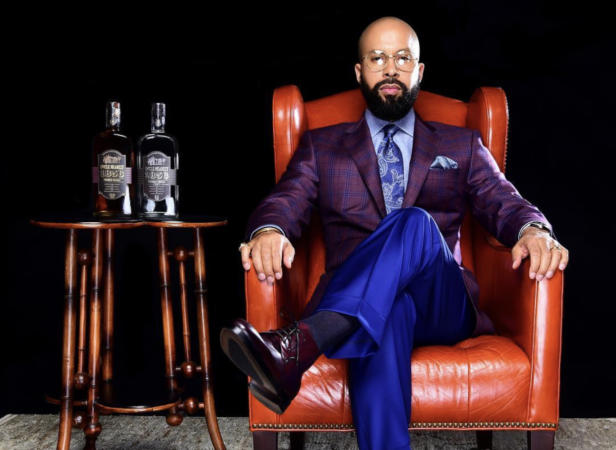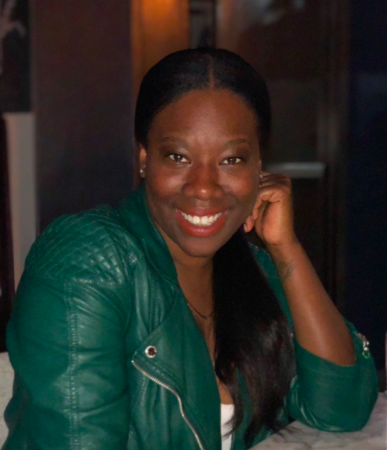The name Kenny Burns is associated with several big labels—Hennessy, Heineken, DeLeón, Ciroc, and more. However, the most impactful moniker in his business portfolio to date is Uncle Nearest Premium Whiskey, named after the first Black master distiller, Nathan “Nearest” Green.
In 2018, Kenny Burns joined Uncle Nearest CEO Fawn Weaver to help amplify the little-known history story behind the brand: Green, a slave, taught Jack Daniel how to make whiskey, which later became Jack Daniel’s.
“I’m one of the first investors,” Burns told AfroTech. “I’m the biggest ambassador for the Nearest, but at the same time, I’m an owner, so I’m very active, whether it’s using my likeness or leveraging my relationships. I’ll do whatever I have to do to make sure this is the biggest story ever. And whiskey.”
A son of Washington, D.C., Burns is an ever-present figure in the entertainment industry. His success began in the Atlanta party scene where he married his hustle, personality, and marketing skills to ascend him to the top ranks of the business. He served as Vice President of Roc-A-Fella Records, launched fashion brand Ryan Kenny and served as the SVP of Brand Development at Combs Enterprises. He also signed platinum-selling rapper Wale to his independent record label, Studio 43.
His serial creative entrepreneurship and sharp business acumen positioned him as a key OG influencer who constantly reinvents himself to curate culture. Today, the self-proclaimed “Lifestyle Specialist” designs family-led streetwear brand BRNS and hosts “The Kenny Burns Show,” a daily digital show on IGTV that has featured guests such as social activist Tamika Mallory, award-winning producer Lena Waithe and marketing exec Bozoma Saint John.
Although he brokered deals and created campaigns for several alcoholic beverage companies across his three-decade-long career, his newfound role in the spirits industry wasn’t intentional.
“I didn’t plan to be in this business,” Burns said. “But I use my personality, my marketing skills to advance opportunities. And when I got [to Uncle Nearest], it felt like home. It was the biggest investment I ever made to this point. I feel like I’m where I’m supposed to be.”
Kenny Burns spoke with AfroTech about his start with Uncle Nearest, the importance of equity, and sharing advice within the Black community.
AfroTech: Your role at Uncle Nearest is different, even though you’ve worked with spirits in a different capacity before.
Kenny Burns: When I met Fawn, she was just this energy, this presence. We talked and she took me to the hallowed grounds, where Jack Daniel came to learn from Uncle Nearest. Walking those grounds, drinking water from the creek where the original Jack Daniel’s was made, going to our distillery, it was a breathtaking experience.
This is like reparations [for me]. When I got to the spirits industry, I created all these platforms that all these companies use, but I didn’t patent it and sell it. So, I didn’t own and benefit. I sold millions of bottles for Grey Goose, I sold millions of bottles for Combs wine and spirits, Ciroc, and DeLeón, but I wasn’t really benefiting.
AT: You were making money for somebody else.
KB: Yeah, that’s why I use the word reparations because all the hard work I had done up to that point of meeting Fawn Weaver was just such a blessing. She saw [the hard work] and offered me equity [in Uncle Nearest], and that’s incredible.
AT: Ownership is so incredibly important. How do you know that an investment is a good one?
KB: I’ve been married for 20 years. I have a 19-year-old and a 15-year-old. We have a nice home, all types of art, and things that will be handed down to my children. But, most importantly, we’ve been building our Studio 43 business for almost 20 years and still haven’t reached the monetary success that we’ve reached with Uncle Nearest in three years. It shows you the juxtaposition. It’s like, yeah we have these things but we need something that’ll be generational. The house could potentially end up being generational, some of the art is Basquiat or Ernie Barnes, but we need other streams.
I also learned in business that you don’t have to put up money all the time. Sometimes your likeness is worth its weight in gold. And that honestly was my opportunity with Uncle Nearest. I saw an opportunity where I can negotiate some equity in the company for my services, and that’s what I did.
So, to answer your question, you better weigh the options. Everything’s not a good investment. I’m passionate about the Uncle Nearest story. I always talk about what is going to be my legacy. And sometimes you don’t realize that your legacy will be wrapped up in someone else’s. And in 250 years, when the Nearest Green Distillery is being visited in Shelbyville, Tennessee, my name will be on the founder’s wall, my face will be in a picture. That’s real legacy.
AT: And it’s Black history.
KB: Exactly. Many people want their names known. I came up in an era where your name was that important, but now, with Uncle Nearest, I surpassed any sparkler moment I’ve ever created in the club. When you look at the history books and they talk about Uncle Nearest, the first African American master distiller on record, the Kenny Burns name will be associated with that.
AT: Pivoting to the technology behind the brand, what’s the distilling process of Uncle Nearest?
KB: Traditionally, the difference between Kentucky bourbon and Tennessee whiskey is our charcoal mellowing process. It’s what Uncle Nearest taught Jack Daniel, what Jack Daniel’s uses today. And it’s African. It’s how we purify things in Africa and Uncle Nearest brought that to whiskey-making.
AT: Looking back a bit, how did you first get introduced to the booze business?
KB: A friend of mine with an account with Axe came to me needing help to get the right partnerships in North America, and we ended up with Ciara’s first video and Jay-Z’s “The Black Album” release in New York City. If you look back, Black culture started to ooze into popular culture. You had guys like Steve Stout with Jadakiss and Allen Iverson [doing a] commercial for Reebok. Then around 2005, all these boutique agencies started popping up. And you have ones that are still around like Team Epiphany.
Hip hop is our civil rights movement, and all we were doing was putting one foot in front of the other. I didn’t even know my skillset was marketing and branding until I had the opportunity to do it for a number of years. I wasn’t educated in a school for it. I had a natural ability to put things in perspective and present them in the way that people wanted to pay for them. And that’s brass tacks right now.
AT: You’re an OG influencer if we’re being honest. And you’re credited for starting influencer marketing before it was a trend.
KB: I am and it doesn’t have to be a publicly acknowledged thing. People always ask me how I’ve been able to stay so relevant and it’s because I take the time with the youngins and teach them what I know. Our heritage is who we are and what we are. We are a people of family and honor and codes and gracefulness. And we’re resourceful. As OGs, we’ve got to [pass down] the jewels. It’s not about any reward for me. It’s about our youth continuing to amplify [the culture] because as long as they’re around, if I do my job right, we’ll be alright.
AT: What do you think about the shift in how this type of marketing is today?
KB: The problem with today’s social sphere vs. the hand-to-hand movement I grew up in is that you can do a lot more on social media. People are making a great living doing it, but at some point, you have to show up and talk to these people in person. You have to be able to project what you’re selling. Mind you, I’m into my third decade of curating culture, so when you look at my experience, I can pull lessons and ideas from so many moments and add to my presentation or add to my delivery. That’s how I got in the spirits business.
Ultimately, the game is to be played. The bottom line to any business is what you can sell and who you can sell it to. And if you know the key players in those businesses, you can move the needle in a major way.
AT: Through your experience in spirits, would you advise more Black people to invest in the business?
KB: Invest in your passion. I truly believe that everybody I know who lives and breathes what they do, they’re successful. Now, we also have to define success for ourselves. I tell my kids and mentees all the time that enjoying the journey is the first part of the process. We all have lofty dreams. We all want to be wealthy and successful and to be able to take care of our families, but we should be just as pleased with accomplishing the small things. You can’t get to the big thing without accomplishing smaller things. Also, I would advise that we make sure we’re putting in the work. Never let your expectations exceed your efforts.


